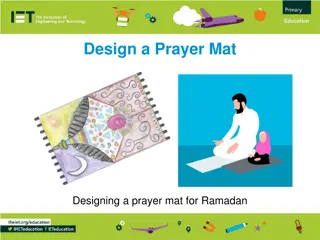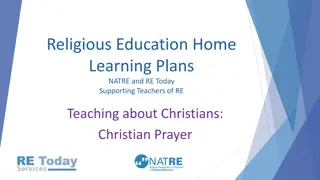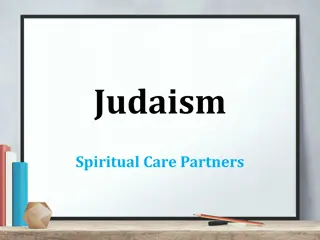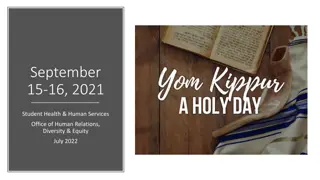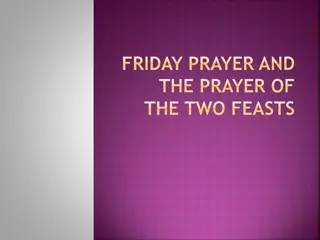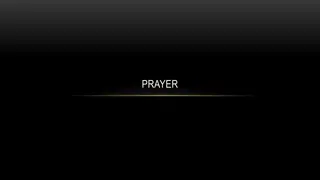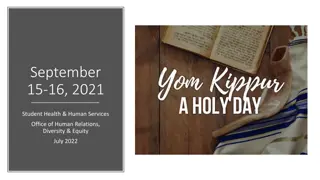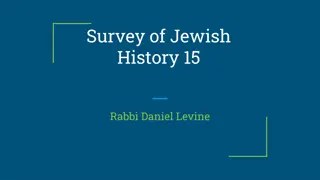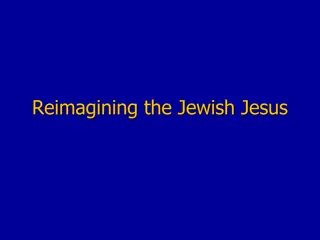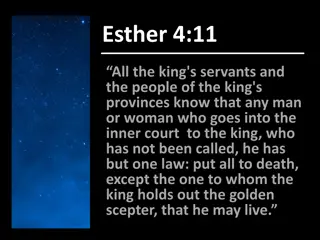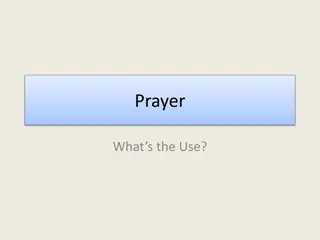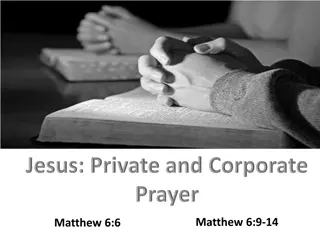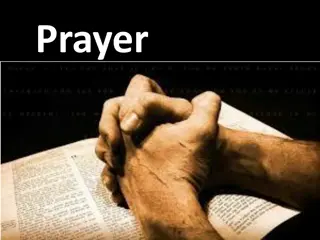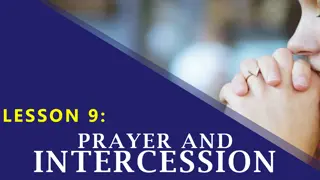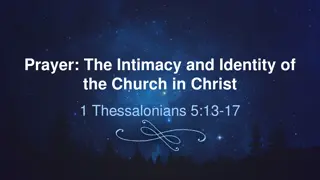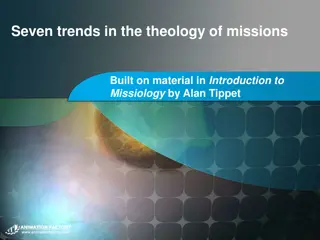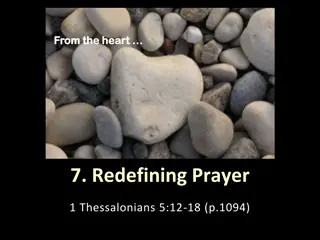Exploring Jewish Prayer Traditions and Theology
Delve into the essence of Jewish prayer, understanding its purpose and significance including elements of gratitude, connection, repentance, and supplication. Discover the wisdom shared by Rabbi Eliezer on leading a righteous life and the transcendent nature of God within the Jewish faith. Explore the theological beliefs emphasizing the eternal unity, prophetic tradition, divine justice, and the promise of redemption in Jewish theology.
Download Presentation

Please find below an Image/Link to download the presentation.
The content on the website is provided AS IS for your information and personal use only. It may not be sold, licensed, or shared on other websites without obtaining consent from the author. Download presentation by click this link. If you encounter any issues during the download, it is possible that the publisher has removed the file from their server.
E N D
Presentation Transcript
Know Before Whom You Stand CONGREGATION SHEARITH ISRAEL PRAYER SERIES BRINGING IT ALL TOGETHER
Defining Jewish Prayer - To Pray (reflexive) Directing your thoughts and feelings toward a higher power (God) Gratitude/Thanksgiving Awe/Wonder/Connection Contrition/Apology Request/Desire Connecting to the past and future through the recitation of eternal words
'' Brachot 28b , , . . . : : The Sages taught: When Rabbi Eliezer fell ill, his students entered to visit him. They said to him: Teach us paths of life, guidelines by which to live, and we will thereby merit the life of the World-to- Come. He said to them: Be vigilant in the honor of your counterparts, and prevent your children from logic when studying verses that tend toward heresy (ge onim), and place your children, while they are still young, between the knees of Torah scholars, and when you pray, know before Whom you stand. For doing that, you will merit the life of the World- to-Come. : . ,
Transcendence and Imminence : : : : : : . . . . . ( ) ( ) ( ) ( ) ) ( ) (1) The king of the world, who ruled before any creature was created. (2) At the time they were made, all was according to His will, and then His name was called "King". (3) And after everything was finished, he alone ruled, awe-inspiring. (4) He was, He is, and He will be with splendor. (5) And, he was first, with no second, to rule over him or to collaborate; (6) with no beginning and no end, he has the strength and the right. . ( . : : : : . . . . ' ( ) ) ) ( ) ( ( (7) And he is my G-d, my redeemer is alive; the rock who sustains me in a distressful day. (8) And he is my banner and refuge, the portion of my cup on the day I call out. (9) In his hand, I safeguard my spirit, [for] when I sleep, [I know that] I will wake. (10) And with my spirit is my body; G-d is for me, and I will not be afraid.
Dominant Theology . . . . . . . . . . . : , , , , , , , , , , , , , ( ) (1) May the living G-d be exalted, and praised, it is found that there is no specific time to find him [for he is eternal]. He is one, and there is none as unified as his unity; it is hidden, and there is also no end to his unity. He has no bodily form, and no body; his holiness has not been ordered for him. He is earlier than anything which he created, [He is] the first and there is none before His earliness. He is surely the lord of the world, to all being, and He teaches his greatness and kingship. An abundance of prophecy He gave to them, his special and splendorous people. There never again arose in Israel like Moses, a prophet and seer of His image. A truthful instruction, G-d gave to His people, by the hand of his prophet who was trustworthy in His house. The G-d will not change, nor will he switch His belief, forever [there is none] except for Him. He watches and knows our secrets, and looks at the end of something at its beginning. (10) He recompensates people with kindness, according to their deeds, and gives the wicked bad according to his evil. (11) At the end of days, He will send our annointed, to redeem those who wait for the end [when] His salvation [takes place]. (12) The dead will G-d resuscitate, in his abundant kindness, blessed be His praised name forever. (2) (3) . (4) (5) (6) (7) (8) (9)
Process Theology Rabbi Brad Artson I live in west Los Angeles in a home that was built in the 1950s. Our dining room has wood paneling along its four walls. When we first bought the house a decade ago, the room was painted a sickly green, presumably in the late 70s during the high watermark of the aesthetics of the Brady Bunch and Partridge Family. The actual wood grain and tone were covered, though I think that in that era people thought such a look was cutting edge. With that greenish coat of pain, the walls looked fake and cheap. When we finally got around to repainting the upstairs of the house, we asked our painter if he could just paint the phony paneling a simple white because the green was hideous. He pondered for a moment, then took his thumbnail and scratched on the panel. The paint peeled away, and he said, "You know, I think that under this green there is actual wood." His team spent three days sandblasting and then varnishing. At the end of the week our dining room was transformed! The wood is so rich and the patterns in the grain are magnificent. It is now my favorite room in the house. I had thought, erroneously, that it was the wood itself that was that sickly green, when in fact, that trashy look was just the coating that someone has painted over it. Modern Western people often approach religion as I did the paneling: they assume that the only way to be religious is to accept the sickly green overlay of Greek philosophy. They take Neo-Platonized Aristotelian scholastic presuppositions and filter religion through those ideas. Then, because they have insurmountable problems with those assertions, they assume that the quandary involves religion itself, or the Bible, or the Talmud, or observance, or God. What process thinking offers is the opportunity to sandblast the philosophical overlay of ancient Greece and medieval Europe off the rich, burnished grain of Bible, Rabbinics, and Kabbalah so that we can savor the actual patterns in the living wood of religion, the Etz Hayim, 1 and appreciate religion for what it was intended and truly is
The problem with the Omnis Omni- Omni- Potent All power Scient All knowing Potent Responsible for all the good and the bad of the world. Scient No human freedom
Some principles of Process Theology God is part of the becoming of all creation God is changing alongside all of us God does not break the laws of physics, but lures us into the best possible choices given all the choices we have previously made God did not create ex nihilo, but rather from the stuff of tohu va vohu the churning chaos of creation that still bubbles up in unpredictable ways. The work of God s creation is bringing order to chaos Special revelation happens through relationship Baruch atah is better understood not as us blessing God, but as recognizing the bounty of our relationship
Prayer We Pray Better Than We Theologize Most people pray with the hope or expectation that their prayers make a difference: that God desires our yearning, that our focus contributes to a different (and better) outcome. Often our prayers are formulated as requests, as though God needed a reminder or gentle persuasion to do the right thing. Or we grovel with words of mollification, as though we could forestall a punishment or entice a reward if we got the words right, felt bad enough, or crawled low enough to remain under the radar of God s notice.
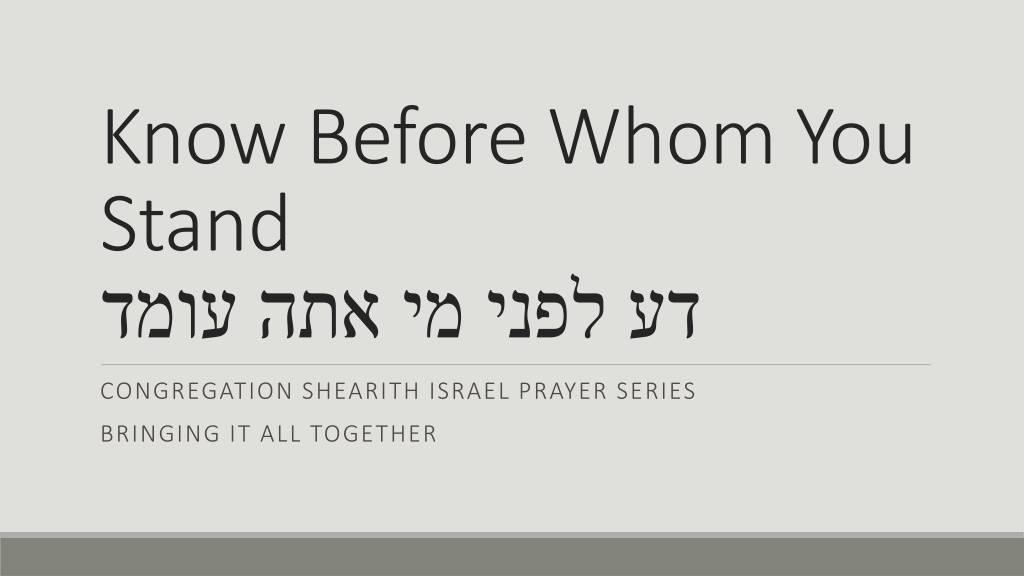
 undefined
undefined







